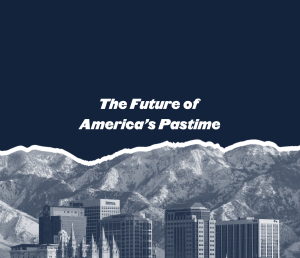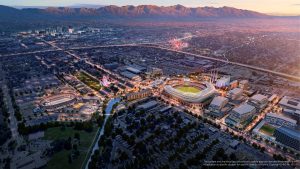Remember the nightly 2002 Winter Games medal awards ceremonies in downtown Salt Lake City that featured big-name entertainment like the Foo Fighters, Brooks and Dunn, and Barenaked Ladies?
Well, during Utah’s hoped-for next Olympics, those ceremonies could be held instead in the Major League Baseball stadium proposed for what’s been dubbed the Power District on the city’s west side, if efforts to land a baseball team are successful.
Or maybe the baseball stadium could be the venue for big air snowboarding competitions, which weren’t added to the Olympics until the 2018 Winter Games in Pyeongchang, South Korea.
“We always keep an open mind, to optimize the experience for our public as well as the athletes,” said Fraser Bullock, president and CEO of the Salt Lake City-Utah Committee for the Games that’s behind the bid to host the 2030 or 2034 Winter Games.
Especially since the preference is for hosting in 2034, when a new MLB stadium could be ready to host Olympic events should the International Olympic Committee award another Winter Games to Salt Lake City.
“Most of our venues are locked in, ready to go. But we have many other choices for things like the medals plaza and big air, depending on the circumstances,” said Bullock, who has been busy signing contracts, largely with the same venues used in 2002,
Bidders want to keep the medals ceremonies downtown, he said, but there’s no guarantee that Block 85, the parking lot owned by The Church of Jesus Christ of Latter-day Saints that was transformed into the Olympic Medals Plaza in 2002, will still be available.
The plan is to charge to attend the nightly event even though it was free in 2002, Bullock said. What’s different this time around is the “overlap” of another U.S. Olympics, the 2028 Summer Games in Los Angeles, anticipated to impact sponsorship revenues.
“We have to put more emphasis on ticketing revenue,” he said, to balance what’s estimated to be more than a $2.2 billion budget for hosting that doesn’t include any state or local tax dollars.
Tickets were required in 2002, but they weren’t always used, said Bullock, the chief operating officer of Salt Lake City’s last Olympics.
“It was always a great crowd,” he said. “But we did have some no-shows. When people don’t have to pay for tickets, they’re less committed. We want to make sure we have a packed house every night.”
Would there be enough demand to fill a stadium nightly during the more than two weeks of the Olympics? Major League Baseball stadiums around the country seat between around 35,000 to more than 56,000 fans.
“Hmmm. Well, we don’t know how big it is yet. But we believe the Games will be very, very popular, so we think it’s possible,” Bullock said. The Olympic Medals Plaza drew upwards of 20,000 people a night in front of a stage dominated by the Hoberman Arch.
The New York Times labeled the plaza “the hottest place to celebrate on a cold night” in its Salt Lake Games coverage, noting people had paid scalpers as much as $200 for the free tickets.
Snowboard’s big air competitions also need a home for 2030 or 2034. MLB stadiums in places like Boston and Atlanta have held similar events over the years by erecting massive jumps and bringing in tons of snow.
“Big air can be in the mountains. It can be in many different places,” Bullock said, adding that in addition to the stadium, bidders are looking at “several possibilities for that because big air can be put anywhere with a lot of room.”
There’s no set timeline for decisions to be made on either a baseball team or another Olympics for Salt Lake City. The IOC may name the hosts for both the 2030 and 2034 Games some time next year from a list of contenders that includes Sapporo, Japan.
Bullock, who’s part of Big League Utah, the coalition of business and community leaders trying to bring an MLB team to Salt Lake City, said the effort is “not at all” competitive with the Winter Games bid.
“In the case of the Olympics, it is privately financed so we’re not seeking any Utah taxpayer money. So it’s really independent of other events and we believe it’s complimentary,” he said, adding the MLB push boosts the bid.
“The more we become a sports hub, like the Jazz and potentially Major League Baseball, that just creates more attraction to the sports world, including the Olympics. It’s a positive,” Bullock said.
“It’s Utah once again stepping forward to expand its presence in the world of sport.”
Read the article by Lisa Riley Roche in the Deseret News.

